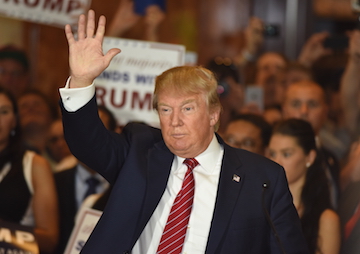Trump Refutes Trump
How do you nail a blob of mercury to the wall? That's a problem the Democratic nominee will have to solve in running against Donald Trump, most of whose positions on major issues are, shall we say, elusive. Republican presidential candidate Donald Trump greets supporters at a campaign event in New York City. (a katz / Shutterstock.com).
Republican presidential candidate Donald Trump greets supporters at a campaign event in New York City. (a katz / Shutterstock.com).
Republican presidential candidate Donald Trump greets supporters at a campaign event in New York City. (a katz / Shutterstock.com).
WASHINGTON — How do you nail a blob of mercury to the wall? That’s a problem the Democratic nominee — likely Hillary Clinton — will have to solve in running against Donald Trump, most of whose positions on major issues are, shall we say, elusive.
I say “most” because Trump has been steadfast on three of his most nonsensical promises: banning Muslims from entering the country, forcing Mexico to pay for a border wall, and deporting 11 million undocumented immigrants. Many of his supporters surely know he could not possibly do any of those things if elected president. But some don’t — and would feel betrayed if Trump suddenly dropped the whole xenophobia thing.
On other issues, however, trying to pin Trump down on what he believes or intends has been an exercise in futility. This is a problem not only for Clinton but for Republicans who would like to support Trump for the sake of unity but want some idea of where the party is being led.
Trump may figure that if he does enough flip-flopping and zigzagging and blowing of smoke, voters will become inured — a strategy of portraying inconstancy as a virtue, not a failing. Then again, this may just be the way Trump is. He may have few settled beliefs aside from an abiding faith in his own brilliance.
The presumptive Republican nominee has spent the last few days trying to explain what he thinks about several economic and financial questions. In theory, this should be a snap for a billionaire tycoon who graduated, as he always reminds us, from the University of Pennsylvania’s renowned Wharton School. But the more Trump talked, the less he actually said.
On “Meet the Press,” moderator Chuck Todd asked Trump about the contradiction between his tax plan, under which the very wealthy would pay less than they pay now, and his suggestion last week that he might be open to raising taxes on the rich. (I should note that I appeared on Sunday’s show but did not participate in the Trump interview, which was pre-taped.)
Trump began by claiming that “nobody knows more about taxes than I do.” Then he insisted that while businesses and the middle class definitely needed tax cuts, “for the wealthy, I think, frankly, it’s going to go up. And you know what, it really should go up.”
Except it really shouldn’t — “We lower the taxes on everybody, very substantially,” Trump said, describing his plan — but then again it might. The plan is merely a proposal, he said, subject to negotiation. And in the end, the rich are “probably going to end up paying more.”
Trump was no more lucid in trying to describe where he stands on raising the minimum wage of $7.25 an hour. You may recall that in a debate last November, Trump said that “I hate to say it, but we have to leave it the way it is.” Otherwise, he said, “we’re not going to be able to compete against the world.”
On Sunday, Trump said he had traveled around the country during the campaign and “I don’t know how people make it on $7.25 an hour. Now, with that being said, I would like to see an increase of some magnitude.”
If you thought that meant he had changed his position, you would be wrong. The states should set their own minimum wage levels, he said. “But I think people should get more. I think they’re out there. They’re working. It is a very low number.”
So, for those keeping score, he’s both for and against tax hikes for the wealthy and wage increases for the working poor.
On Monday, in an interview with CNN, Trump tried to clarify comments last week that sounded as if he wanted to default on part of the U.S. debt. That’s not at all what he meant, he said, claiming that “I understand debt better than probably anybody.” Instead, he was suggesting the Treasury could offer to buy back U.S. debt if and when interest rates were to rise.
“First of all,” he said, “you never have to default, because you print the money. I hate to tell you, OK?”
Alrighty then.
How does a policy wonk like Clinton run against a policy-phobe like Trump? Trying to define him as insufficiently studious, overly capricious and fundamentally unserious would be like painting a caricature of a cartoon.
Maybe Clinton should focus more on delivering an inspirational message of her own. The job of refuting Trump is already being done — by Trump.
Eugene Robinson’s email address is [email protected].
© 2016, Washington Post Writers Group
Your support is crucial…With an uncertain future and a new administration casting doubt on press freedoms, the danger is clear: The truth is at risk.
Now is the time to give. Your tax-deductible support allows us to dig deeper, delivering fearless investigative reporting and analysis that exposes what’s really happening — without compromise.
Stand with our courageous journalists. Donate today to protect a free press, uphold democracy and unearth untold stories.









You need to be a supporter to comment.
There are currently no responses to this article.
Be the first to respond.